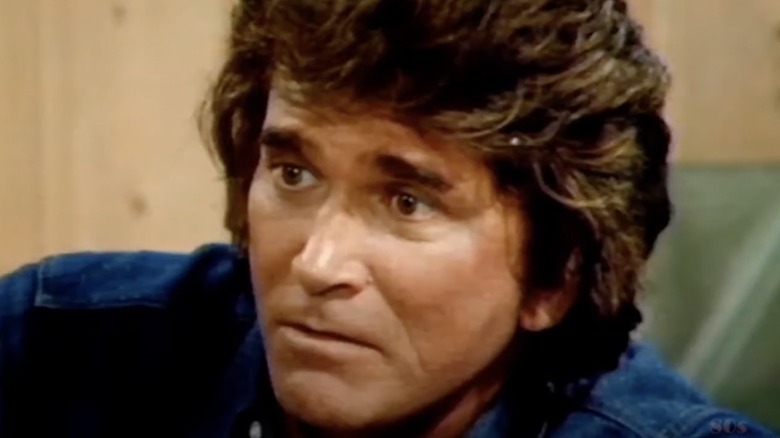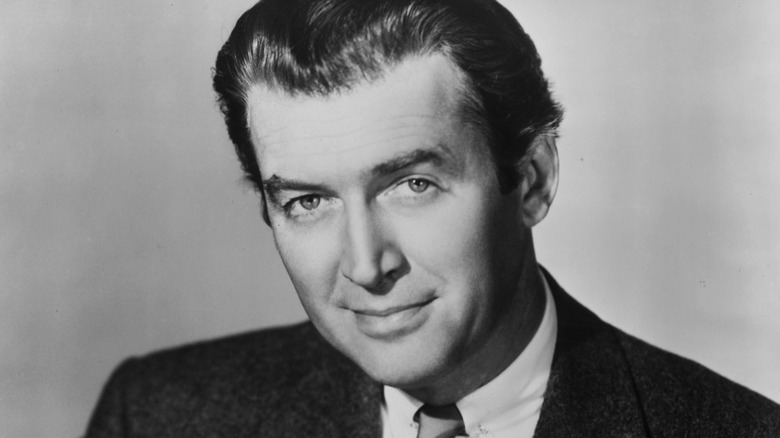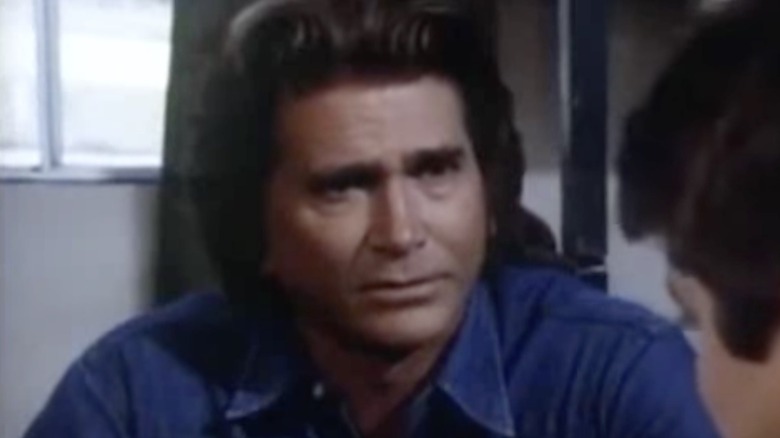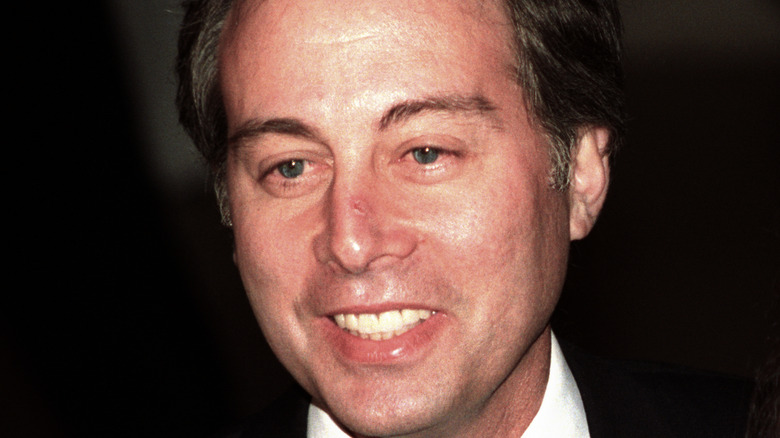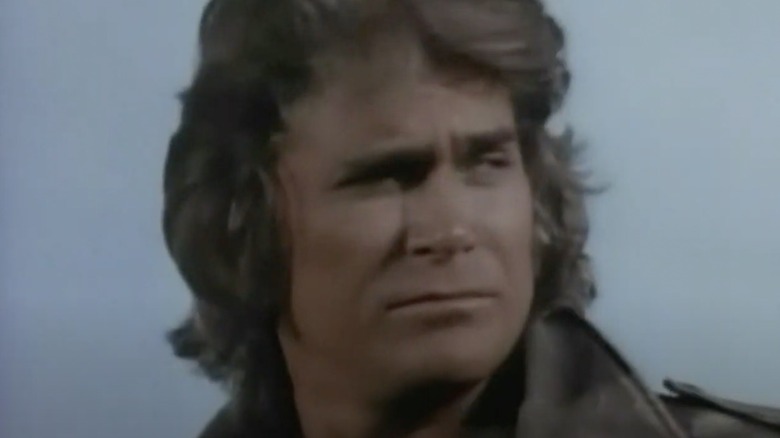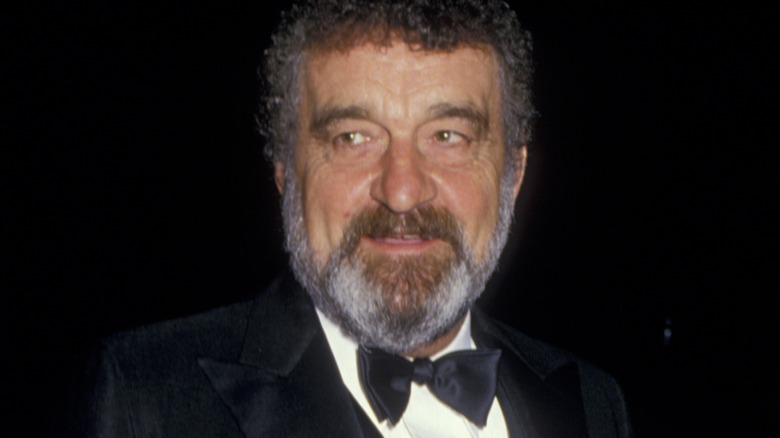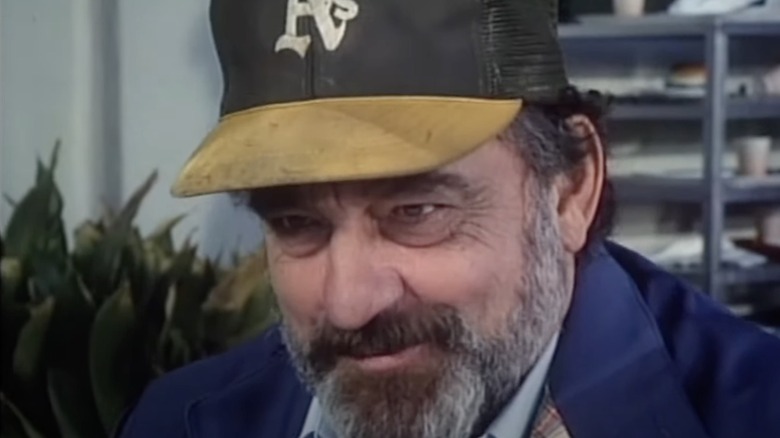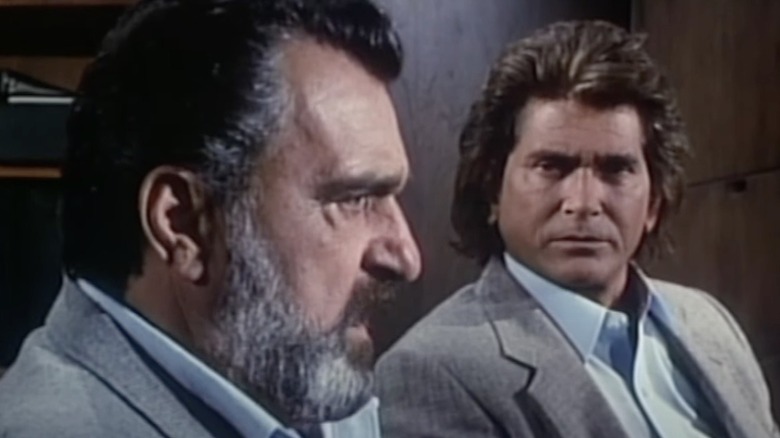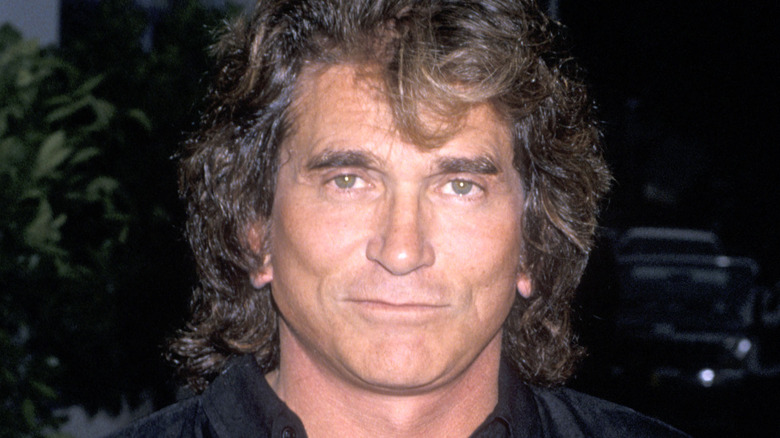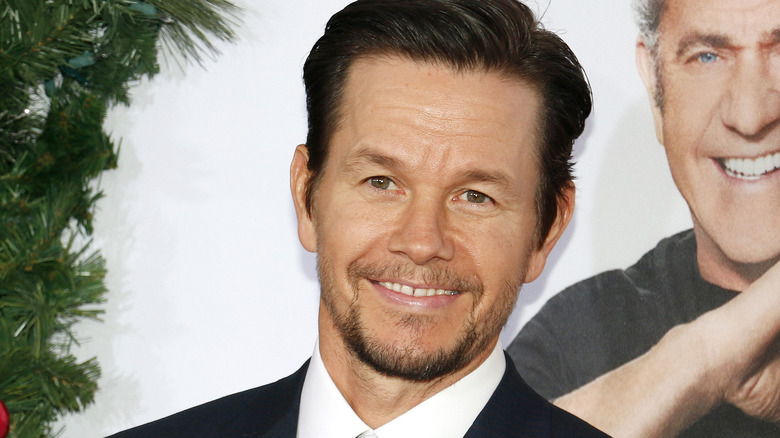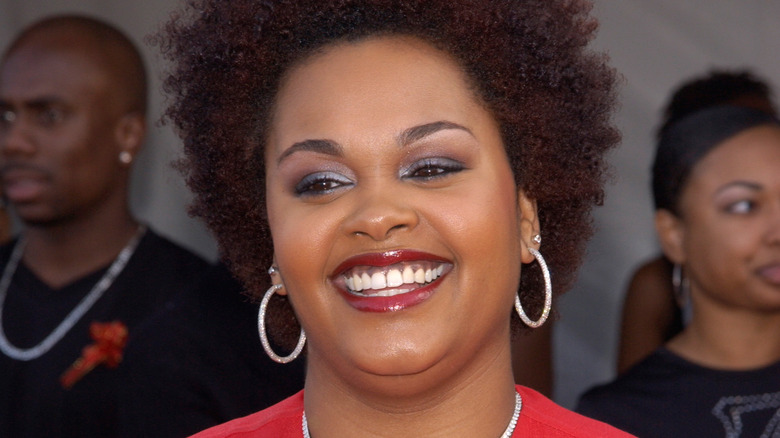The Untold Truth Of Highway To Heaven
In 1984, almost immediately after he wrapped up a decade as a writer, director, producer, and star of the 19th century-set family drama "Little House on the Prairie," Michael Landon started another long-running, squeaky-clean, heart-tugging series for NBC: "Highway to Heaven." Landon created the show and starred as a deceased man sent up to Heaven and then back down to Earth on assignment as a tentative angel, tasked with helping people turn their lives around and show that somebody cares. Each week, the angel known by the purposely vague name of Jonathan Smith, along with Mark Gordon (Victor French), an almost-broken former police officer, helps somebody new and then moves along on America's highways, each time getting a little bit closer to getting his wings.
Was "Highway to Heaven" treacly, melodramatic, and broad? Absolutely. But was it also the most inspirational and comforting show on network television from 1984 to 1989? Yes it was. Here's a look at the creation and impact of one of the most unique TV shows of the otherwise glitzy and superficial 1980s, "Highway to Heaven."
Jimmy Stewart, among other things, inspired Highway to Heaven
Two disparate sources lead to "Highway to Heaven": a Christmas movie and traffic. In his memoir "The Last Great Ride," NBC's president of entertainment Brandon Tartikoff recalled discussing favorite movies with Michael Landon in the early 1980s, and Landon mentioned the 1946 classic "It's a Wonderful Life," about an angel-in-training named Clarence (Henry Travers) who helps depressed George Bailey (Jimmy Stewart) find meaning in life again. Tartikoff said he liked the movie, too. "I'm glad," Landon reportedly replied, "because I'd like to do something with the same spirit, the same human values." Landon laid out his premise: He'd play an angel working on behalf of the Christian perception of God "who comes down each week and changes somebody's life, just like Clarence did for Jimmy Stewart."
In 1988, Landon told the Los Angeles Times that the spark for "Highway to Heaven" came when he was sitting in his car. "I was driving through Beverly Hills to pick up my kids on a Friday night, and people were honking at each other," he said. "There is no worse place for that than Beverly Hills; I think when people have a little bit more money, they really believe that the Red Sea will part and their car will go forward." That got Landon thinking about the mass frustration before his eyes. "If they would just spend that time being nice," he added, "the flow of traffic is going to go much better."
NBC brass didn't think a show about an angel would fly
Brandon Tartikoff, as he wrote in "The Last Great Ride," didn't think the show that would become "Highway to Heaven" would work in the TV landscape of the 1980s, or that multi-hyphenate Michael Landon was picking the right project to follow a decade of "Little House on the Prairie."
"You're going to write, produce, direct, and star in a series where you essentially play God," he told Landon. "No pun intended, but you're going to get crucified by the TV critics." Landon said that he no longer really cared what critics thought because his years of television experience indicated that viewers knew what they'd get out of him, and they enjoyed it. "I know how to make people cry," he said. "And I believe that there's an audience for that. If you can move people in an hour of television, they'll be back next week for more."
Trusting Landon, who, with "Little House on the Prairie" and "Bonanza" before that, had consistently delivered millions of viewers to NBC, Tartikoff ordered a pilot script.
How an NBC executive gave Highway to Heaven its name
After NBC president of entertainment Brandon Tartikoff signed off on Michael Landon's pitch for a show about a provisional angel, the actor-writer turned in a double-length pilot script to the network in just one week's time, according to Tartikoff's memoir "The Last Great Ride." The teleplay would account for two hours of TV time, but it was also a first draft with some elements still rough and needing to be worked out, particularly the title — Landon initially wanted to give the series the generic title of "Jonathan Smith," after the assumed name of the angel he wanted to portray. Tartikoff, however, jokingly called the script from the laid-back Southern California denizen and Hollywood insider "Jesus of Malibu." When Landon heard that, he objected. "Landon reminded me that he was Jewish," Tartikoff wrote, resulting in a new nickname-meets-working title of "Moses of Malibu," after the Old Testament figure.
The show that eventually came to be known as "Highway to Heaven" got its actual and final title from a defunct project, a renamed remake of the 1960s road drama "Route 66," with which Landon's show shared a format. Tartikoff suggested it, and after thinking about it "for a couple of seconds," Landon accepted.
NBC hated Highway to Heaven
In his book "The Last Great Ride," NBC entertainment executive Brandon Tartikoff called "Highway to Heaven" an "idea that I personally thought was preposterous but had no intention of derailing, at least not immediately." That's all because he couldn't really say no to the project or the man who wanted to make it. NBC was contractually obligated to at least launch, in good faith, the successor to Landon's "Little House on the Prairie," a hit for the network since the mid-1970s.
Nevertheless, when he got a load of Landon's pilot script for his new show, Tartikoff and other NBC executives found it "a trifle old-fashioned." After NBC spent $3 million producing a pilot episode from the script, executives got a viewing, and some were not impressed. "This show is so dated they should have shot it in black-and-white," said bigwig Jeff Sagansky, according to Tartikoff. "It's an embarrassment." Of the 40 network managers who filled a screening room to watch, 25 walked out.
NBC considered writing off the $3 million as a loss and not airing "Highway to Heaven," but the network was obligated to put show on the air ... where it was a massive ratings success, beating ABC's top 10 hit "The Fall Guy." "Highway to Heaven" thus got a full season order, and in 1984-85, NBC was the most-watched network for the first time in 30 years, a success Tartikoff credits in part to the success of Landon's series.
Michael Landon had to insist on casting Victor French
Earthbound angel Jonathan Smith on "Highway to Heaven" needed a human partner to help him get to the people who needed his help (and perhaps needed some assistance himself). That character manifested as Mark Gordon, a former Oakland, California, police officer (that's why he always wears an A's cap) and brother of a retirement home manager whom Jonathan meets when he works his heavenly magic on the elderly residents. Before long, Mark has figured out that Jonathan is an angel, and together, they're moving from city to city on assignments from "The Boss" upstairs.
Victor French played the bearded and increasingly less bitter Mark Gordon on "Highway to Heaven," which marked the third long-running TV show on which he'd co-starred with Michael Landon. On "Little House on the Prairie," he played alcoholic mountain man and brawler Mr. Edwards, and on "Bonanza," French played four different characters in five episodes. Landon and French had grown close over the years, and the former moved to cast his friend as Mark Gordon. According to the Los Angeles Times, NBC wanted to put a young, classically attractive, rising star in the role, not a 50-year-old character actor. Landon stood his ground and got his way, allowing French to get the job he likened to "working with the man I love."
Working on Highway to Heaven was a cushy job
Producing a TV show, especially an hour-long drama for a broadcast network that requires around 20 episodes a season, is famously time- and labor-intensive, and that can be very stressful and lead to a poor work-life balance for cast and crew. "Highway to Heaven" was reportedly the exception to the rule. As the creator, developer, executive producer, star, and director of more than 80% of the episodes, Michael Landon was unquestionably the boss on the set of "Highway to Heaven," and the show's staunch support of the importance of family and togetherness above all other things played out in how it was made. Landon told the Los Angeles Times in 1988 that creating a family-like atmosphere on set relaxed employees to the point where the show came in under budget and on time. "Even the guy who brings our coffee reads every script," co-star Victor French added.
In the 1980s, a 16-hour day was the standard in network television. "Highway to Heaven" crew members would be home by dinnertime. Everyone on staff got a three-week break for the winter holidays and another three-week production shutdown in the middle of the season, and any extra money in the budget at the end of the year was split up into crew bonuses.
Was there a Highway to Heaven curse?
For a show as sweet and positive as "Highway to Heaven," the specter of death haunted the series. The main character was technically a dead man named Arthur Thompson, now working as an angel with the pseudonym Jonathan Smith. Moreover, the show's main cast all died tragically, alarmingly, and in similar circumstances. In the Season 1 episode "One Winged Angels," Jonathan gets God to make it rain inside a car when Mark lights up a cigarette, suggesting that the deity is "not so anxious" for the man to die and wind up in Heaven. French was a smoker off-screen, and in 1989, just months after production on "Highway to Heaven" wrapped, he died of lung cancer at age 54, according to the Associated Press. Two years later, Landon, 54, died of pancreatic cancer, according to People.
Apart from Landon and French, James Troesh appeared in more episodes than any other actor, playing the lawyer Scotty Wilson eight times in the series. According to Variety, Troesh died in 2011 at, like Landon and French, age 54.
The not so heavenly cancellation of Highway to Heaven
In May 1988, NBC announced its lineup for the upcoming fall TV season, and "Highway to Heaven" wasn't on it, instead shifted to midseason replacement status. An aging show, its ratings had slipped, falling out of the top 30. As such, the show's fifth season consisted of just 13 episodes, which aired very sporadically and out of order — a couple in December 1988, one in March 1989, and the rest dumped into the little-watched summer months. The show didn't get a proper finale — the last episode, a Christmas special, aired in August 1989. Michael Landon confirmed in an interview on "The Tonight Show" in May 1989 that the series had ended production.
Landon, the creator and star of "Highway to Heaven," broke free of his 30-year connection to NBC, which stretched back through "Little House on the Prairie" and "Bonanza," and jumped to CBS for his next series, "Us." The show would have been about a wrongfully convicted man freed from prison who becomes a traveling newspaper columnist looking for inspirational stories, but only the pilot was ever produced and aired, owing to Landon's death in 1991.
Mark Wahlberg tried to revive Highway to Heaven
The hottest new thing in television in the 2010s wasn't new at all — reboots and remakes of old shows were in demand at the big networks, as it's easier to promote and market a familiar brand or franchise and play off of the goodwill and nostalgia of viewers than it is to get people on board with something totally new. Alongside reboots of shows like "Full House," "The X-Files," "Roseanne," and "24" came a proposed new version of "Highway to Heaven."
According to The Hollywood Reporter, the cable channel A&E started to develop a present-day-set version of the 1980s show about a helpful angel. The twist was that it would have carried a harder edge and been a bit more gritty than its inspiration, especially under the eye of executive producer Mark Wahlberg and with a pilot script written by John Wirth, who'd worked as the showrunner of the harrowing and violent "Hell on Wheels." The new "Highway to Heaven" would have starred new actors, as original cast members Michael Landon and Victor French had died decades earlier. A&E ultimately passed on the series.
Highway to Heaven is coming back to television
Less than a decade after A&E attempted to bring back "Highway to Heaven" with a dark, 21st-century spin, another basic cable network decided to give the idea a go, changing a few elements but adhering close to the spirit of the original show about intervening angels. In June 2021, Deadline reported that Lifetime had ordered a brand-new "Highway to Heaven." Unlike the original, this won't be a weekly series at all but rather a series of occasional made-for-TV "event movies."
"Highway to Heaven" 2.0 will center on new characters, too. Jill Scott, primarily known as a singer, will portray a newly anointed angel named Angela, who descends to Earth to help people in desperate need. Every "Highway to Heaven" angel needs a sidekick, and instead of a grizzled ex-police officer named Mark Gordon, Angela's partner will be a junior high principal named Bruce, who finds out that Angela is an angel when she goes undercover as a counselor at his school. Barry Watson, who played the oldest son on the religious-themed '90s family drama "7th Heaven," has signed on to play Bruce. Scott will also help produce the movies, which are being made with the approval and assistance of Michael Landon's estate and surviving relatives.
